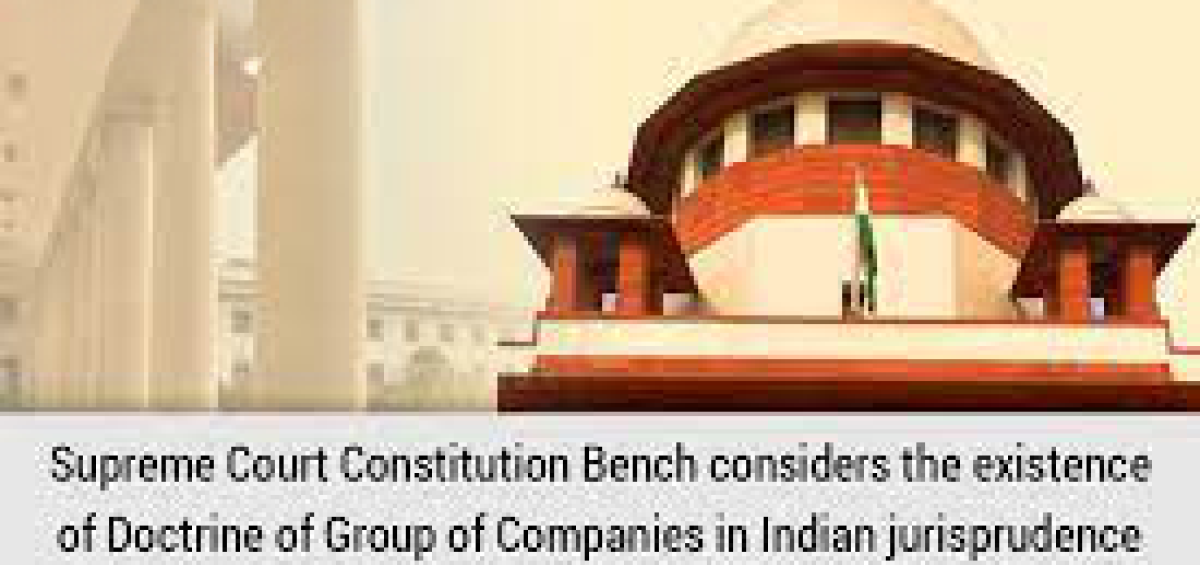Group of Companies Doctrine- an Arbitration Agreement entered into by a Company within a group of Companies can bind its non-signatory affiliates, if the circumstances demonstrate that the mutual intention of parties was to bind signatory as well as the non-signatory parties.
Supreme Court: The Constitution bench comprising of Dr. Dhananjaya Y. Chandrachud C.J., Hrishikesh Roy, Pamidighantam Sri Narasimha, J.B. Pardiwala and Manoj Misra, commenced the hearing of Cox and Kings Limited v SAP India Private Limited, pertaining to the issue of:
- Whether the Group of Companies Doctrine exists in Indian jurisprudence, independent of statutory provision?
- Whether the same can be read into Section 8 of the Arbitration and Conciliation Act, 1996 (‘Arbitration Act’)?
- Whether it should continue to be invoked on grounds of a single economic reality principle?
- Whether it should be construed as a means of interpreting the implied intent or consent to arbitrate between the parties?
In the matter at hand, Cox and Kings Limited (‘petitioner’) provides tours and travels services. SAP SE GMBH (respondent 2) is a European multinational software company incorporated under the laws of Germany.
The Petitioner had entered into an SAP Software End User License Agreement & SAP Enterprise Support Schedule (‘License Agreement’) dated 14-12-2010. Respondent 2 was the proprietor and licensor of the software. SAP India Private Limited (‘respondent 1’) was merely its licensee in India which was a subsidiary of respondent 2. Therefore, respondents 1 and 2 were allegedly the same ‘group of companies.’ The agreements signed between the parties also recorded that the SAP Hybris Solution software suitable for the use of the petitioner was owned by respondent 2 whereas respondent 1 was merely a licensee. All agreements executed between the parties were composite in nature forming an interlinked transaction by both respondent 1 and 2 to provide services to the petitioner.
Petitioner contended that serious prejudice was caused to their functioning due to the challenges and delay in the execution of the project on part of respondent 1. Since no concrete response or action was received from respondent 1, petitioner escalated the issue to the proprietor of the software respondent 2- listing out several issues with the project and requesting to bring the project back on track. Consequently, respondent 2 assured the petitioner to monitor progress of the project and revise engagement plan and delivery approach.
On 01-12-2016, respondent 2 resorted to pushing the blame on petitioner regarding the failure of the project stating that various bills were pending to be paid by the petitioner. The petitioner was served with a notice dated 07-11-2019 by way of which they invoked the arbitration clause 15.7 of the Services General Terms and Conditions Agreement for adjudication of disputes. Petitioner had filed a counter claim for a sum of Rs 45,99,71,098/- with interest which was challenged on the ground of maintainability by respondent 1 before the Tribunal.
NCLT, Mumbai Bench had admitted the application of Section 7 of the Insolvency and Bankruptcy Code, 2016 (‘IBC’) vide order dated 22.10.2019 and accordingly imposed a moratorium under Section 14 of IBC. Consequent to which the Tribunal adjourned the arbitration proceedings sine die in view of the moratorium imposed on the petitioner.
The resolution applicant of the petitioner had appointed former Judge of Supreme Court Justice Arijit Pasayat as its nominated arbitrator and called upon the respondent to appoint their arbitrator. Since neither respondent 1 nor 2 responded, they were constrained to file the present arbitration petition under Section 11(6) read with Section 11(12)(a) of the Arbitration Act for appointment of Arbitrator in International Commercial Arbitration.
While inferring the intention of respondent 2 from the terms of the mulitple contracts, the petitioner relied upon Chloro Controls India Private Limited v. Severn Trent Water Purification, (2013) 1 SCC 641 and contended that under the “Group of Companies” Doctrine, an Arbitration Agreement entered into by a Company within a group of Companies can bind its non-signatory affiliates, if the circumstances demonstrate that the mutual intention of parties was to bind signatory as well as the non-signatory parties.
It was held that “it does occasionally happen that the claim is made against or by someone who is not originally named as a party. These may create some difficult situations, but certainly, they are not absolute obstructions to law/the arbitration agreement. Arbitration, thus, could be possible between a signatory to an arbitration agreement and a third party…, whereby an arbitration agreement entered into by a company, being one within a group of companies, can bind its non- signatory affiliates or sister or parent concerns, if the circumstances demonstrate that the mutual intention of all the parties was to bind both the signatories and the non-signatory affiliates. This theory has been applied in a number of arbitrations so as to justify a tribunal taking jurisdiction over a party who is not a signatory to the contract containing the arbitration agreement.”
Matter adjourned for hearing for 28-03-2023. [Cox and Kings Limited v SAP India Private Limited, Arbitration Petition 38 of 2020, matter heard on 23-03-2023].






Leave a Comment